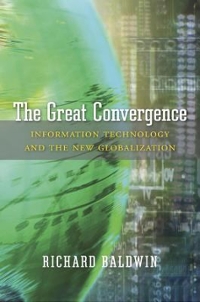Question
Please help me with those questions! Thank you! Because it has no regard for borders, the coronavirus has been referred to as the Great Equalizer.
Please help me with those questions! Thank you!
Because it has no regard for borders, the coronavirus has been referred to as the Great Equalizer. But its impact is not equal by any stretch of the imagination. While China, Europe, and Northern America may recover relatively fast, emerging market economies are less resilient. The combined health, economic, and financial tolls they now endure may cause them to face the greatest recession in decades.
ByJack Gao| When COVID-19 hit, China's strong state and centralized public administration allowed it to suppress the domestic spread. In Europe, welfare systems and appropriatepolicy responsesmade sure workers have less to worry about when economies reopen. The United States (despite Trump's handling leaving much to be desired) enjoys a unique status of its own. The American economy and "exorbitant privilege" of the US dollar mean that policy responses can be put forth in short order, and with relatively few negative repercussions. For most emerging market economies, however, none of this can be taken for granted. The coronavirus is shaping up to be the "perfect storm" that many feared. It could sink the developing world into a deep economic recession.
NO DOCTORS AND NO FOOD
Let's start withpublic health.While the increase of new deaths in the epicentersUS, UK, Italy, Spainappears to be slowing, the virus rages on in major developing nations. Russia, India, Mexico, and Brazil continue to report well above a thousand new daily deaths, and many of them are still on an upwardtrajectory. In India, a briefrelaxationof the lockdown was met with a jump in deaths, underscoring that the fight to contain the virus will be an uphill battle.
Although health systems are being tested everywhere, the ones in developing countries were already under strain before COVID-19 reared its head. For example, the average number of health workers per 1000 people in OCED countries is 12.3. In the African region,this ratiois only 1.4.
As if the health crisis is not crushing enough, the United Nationswarnsof a "hunger pandemic" as an additional 130 million people could be pushed to the brink of starvation this year, with the vast majority of them in developing countries. The coronavirus may cross borders easily, but the suffering it causes is not equal across countries.
LOCKED DOWN AND OUT OF WORK
If the human toll of the pandemic is appalling,the economic damagesto countries are unprecedented as well, as countries implement lockdown and "social distancing" to combat the virus. In the latest World Economic Outlook growth projections by the IMF, emerging market economies as a whole are expected to contract 1% this year, for the first time since the Great Depression. Literally all developing countries may be in economic decline as a result of COVID-19, with India and China eking out paltry growth. Still, these headline numbers mask the true extent of economic hardship.
Take working from home, for example. Economists havedocumenteda clear relationship between the share of jobs that can be done at home and the national income level. In a developed country like the United States, some 37 percent of jobs can be performed at homeeducation, finance and IT being at the top of the scale. In some developing economies, less than 10 percent of jobs can be done remotely.
On top of all this, global remittances are collapsing. The amount of money transferred to migrants' home countries mayfallby 20 percent as workers see dwindling employment. This is terrible news for countries like Lesotho, where remittances are as much as 16% of GDP.
WHERE'D THE MONEY GO?
Theglobal financial systemexacerbates these struggles with itscore and periphery topology. During good times, foreign capital flows into emerging markets, looking for higher yields. But in bad times, when that capital is needed most, it swiftly disappears. This dynamic is now on full display. As investors started to realize the true scale of the pandemic and major central banks initiated new rounds of monetary easing, emerging economies saw capital flight as investors rushed to safer assets. An estimated 100 billion portfolio dollarsfledemerging markets in the first quarter alone.
In the face of such severe dollar shortages and liquidity crunch in developing countries, the Federal Reserve had toexpandcentral bank liquidity swaps andlauncha new lending facility to come to the rescue. The impact of such international measures is still an open question. But with currency depreciation, higher borrowing costs, declining official reserves, and falling commodity prices, it appears that the financial stress emerging economies are under may be difficult to reverse.
THE TRIPLE WHAMMY
This way, developing countries face a health-blow, and economic-blow, and a financial-blow, all at once. An emerging market economy faced with just one of those would have resulted in a crisis. But amid COVID-19,allemerging economies were are confronted withall threecrisesat the same time. The damage done by this "triple whammy" could plague the developing world for years to come.
Specifically, please comment on the "COVID-19 NOT as a great equalizer" point the author was trying address in the article.
1. We discussed the equalization effect of different endowment from each country.Please tell us your opinion about whether COVID-19 pandemic may serve as an equalizer and bring world economy closer to each other.Please supply your reason with explanation.
2. According to your opinion above, which country/economy will play a more significant role in the global economy? Explain.
Step by Step Solution
There are 3 Steps involved in it
Step: 1

Get Instant Access to Expert-Tailored Solutions
See step-by-step solutions with expert insights and AI powered tools for academic success
Step: 2

Step: 3

Ace Your Homework with AI
Get the answers you need in no time with our AI-driven, step-by-step assistance
Get Started


